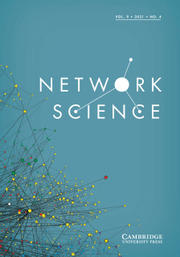Article contents
The influence of social networks and homophily on correct voting
Published online by Cambridge University Press: 03 April 2014
Abstract
There is empirical evidence suggesting that a person's family, friends, or social ties influence who a person votes for. Sokhey & McClurg (2012) find that as political disagreement in a person's social network increases, then a person is less likely to vote correctly. We develop a model where voters have different favorite policies and wish to vote correctly for the candidate whose favorite policy is closest to their own. Voters have beliefs about each candidate's favorite policy which may or may not be correct. Voters update their beliefs about political candidates based on who their conservative and liberal social ties are supporting. We find that if everyone's social network consists only of those most like themselves, then the conditions needed for correct voting to be stable are fairly weak; thus political agreement in one's social network facilitates correct voting. We also give conditions under which correct voting is stable for networks exhibiting homophily and for networks exhibiting random social interactions.
Information
- Type
- Research Article
- Information
- Copyright
- Copyright © Cambridge University Press 2014
References
- 5
- Cited by

